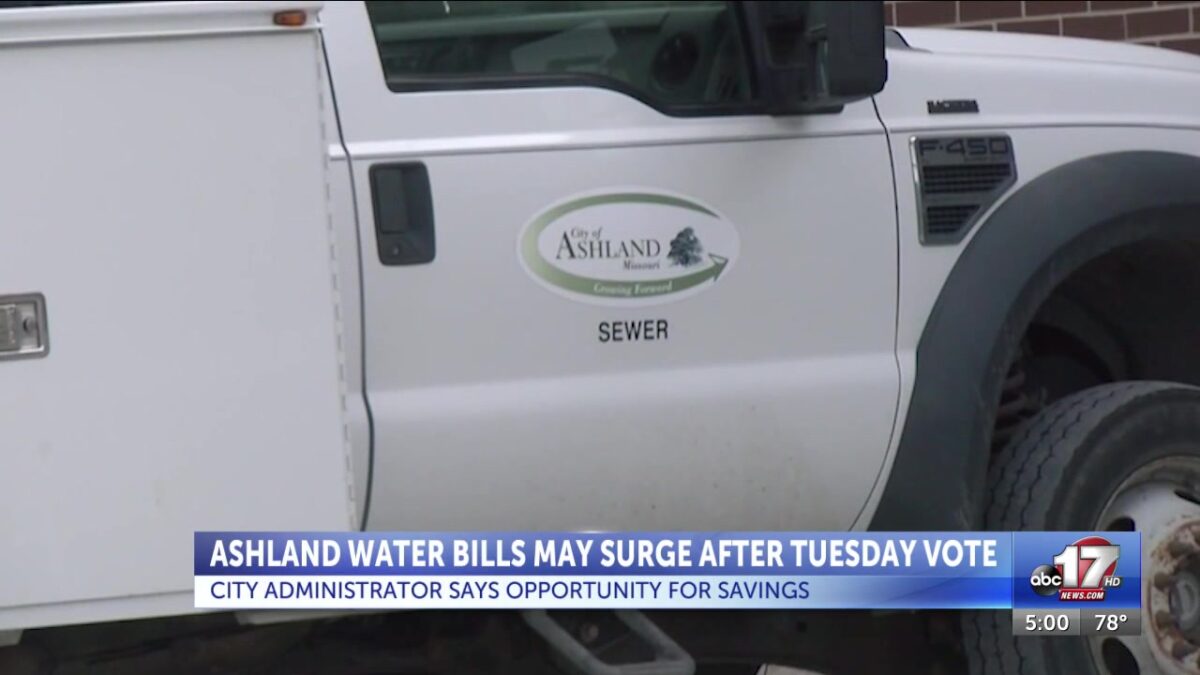Ashland water bills may surge as city moves forward with sewer project

Haley Swaino
ASHLAND, Mo. (KMIZ)
The Ashland Board of Aldermen voted Tuesday night to increase sewer service rates to offset the cost of upgrading the city’s sewer facilities.
The city is moving ahead with improving its sewer system, despite a “no” vote on a $40 million bond issue for sewer improvements in 2024.
“We implemented a new rate structure and new rates with a May 1 effective date as part of financing this expansion project,” City Administrator Kyle Michel said ahead of the meeting. “So what’s being considered tonight is simply an augmentation of those rates.”
The vote ended in a tie, with Mayor Dorise Slinker the deciding vote.
The average monthly water bill in Ashland is $52.65, according to a study conducted for the city in March. Under the recent sewer rate approval, the average bill could go up to $64.76 in 2026, $79.65 in 2027 and $97.97 in 2028.
“I think it’s being portrayed as an increase, but it’s not necessarily an increase,” Michel said. “In some instances, it’ll be cost-saving to the users.”
A “yes” vote from the council on Tuesday means that fixed rates based on water meter size will decrease, while variable rates based on consumption in gallons will nearly double by 2028.
“You have a fixed rate every month and then you have a variable rate which is based on how much you actually use,” Michel said. “What we’re doing tonight is we’re just augmenting that ratio. So what’s going to happen is the fixed rate will go down, and then the variable rate will slightly increase. And just based on your consumption, there is opportunity for cost saving there.”
Rates already saw a 23% increase in July after Gov. Mike Kehoe used a veto to strike down $11 million from the state budget for sewer system improvements in Ashland.
“Funding from the state would have reduced or eliminated part of these increases and would also have positioned the City to return some aspects of the project that were cut,” Michel wrote in an email in July. “While it is disappointing that our funding request was cut, our project was not exclusively singled out. All wastewater funding requests were cut. We did what we could to ensure our project stayed in the budget in an effort to protect our rate payers.”
He spoke with ABC 17 News about Kehoe’s veto again on Tuesday.
“A lot of folks are trying to suggest that the governor, his veto of funding, has a bearing on this project,” Michel said. “I mean, it does. Obviously, we wanted that money, but the rates that we’re putting in place on May 1 and the rate assumptions that we’re planning for in terms of repayment of debt, it didn’t contemplate it getting that $10 million [$11 million]. The $10 million [$11 million] would have just been an aftereffect that would benefit the project and obviously drive cost down.”
The city broke ground on the wastewater treatment facility on May 5. Previous reporting indicates the expansion will increase the facility’s capacity from 600,000 gallons per day to 1.6 million gallons per day. It could treat up to 2.6 million gallons per day once it is fully built out.
The project will be completed and operating by May 2026, according to Michel.
“We’re approaching the actual point of needing to borrow money for this project and go out for a bond sale. We’ve kind of reached that point where we can reevaluate the rate structure and make sure that it’s working correctly for not only the repayment of that debt, but working how it should for the customers to make sure we’re not overburdening them as much as possible,” Michel said.